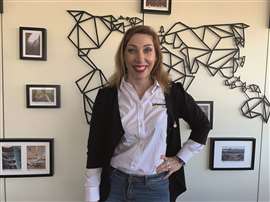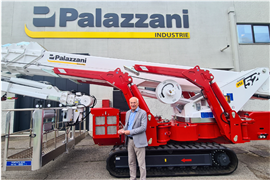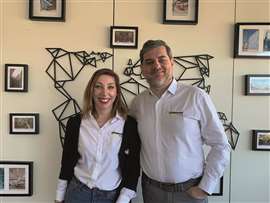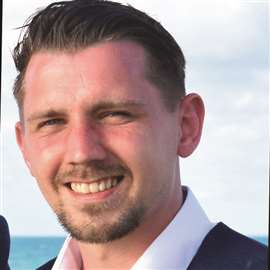Paola Palazzani on a new ‘people first’ strategy
02 June 2024
Palazzani Industries has a new ‘tandem’ management structure, with Paola Palazzani taking over the role of President from her father Davide.
Speaking to Access International in April, Paola Palazzani has promised to refocus the spider lift specialist into a ‘people’ orientated organization aimed at growing its rental customer base.
 Paola Palazzani, the new president of Palazzani.
Paola Palazzani, the new president of Palazzani.
With more than 25 years of experience at the company, having joined it the age of 21, Paola will lead the company’s long-term strategy, while Davide, who previously solely headed up the company, will now run its finances, supported by colleague Dr. Cristian Marchina, as CFO.
Alongside Paola, engineer Francesco Zola, who is Paola’s husband, will use his longstanding experience in the automotive industry, to head up Palazzani’s strategic operations. He has become the company’s managing director and CEO, also taking a place on the board.
Paola said, “I believe that our tandem leadership will aim to consolidate and strengthen the company’s position in the global market.”
From humble beginnings to leadership
Paola has worked across Palazzani, from answering phones as a summer job in her student days, before joining the company permanently in the spare parts warehouse, to moving through the technical and quality certification areas, to ultimately settling in the sales department.
While Paola’s job status had changed under her new leadership position, “I’m still dealing with sales - that is my big passion,” she adds.
The big difference is how the company is now structured. “In the past we were in that category of a small Italian company where everything is built around an entrepreneur.”
Today the company has 30 employees. “When we were 30 people, it was easier to take care of everything, but now we are 70.”
“So, we have moved from the entrepreneur-based business, with one person in the central of view, to one that has different managers for different processes.
History in the makingThe original Palazzani company was established as an industrial manufacturer in 1935, then moved into construction equipment with earthmoving machines in 1954, developing a wide range of loaders, excavators and hydraulic cranes over the decades. In the 1980s, the company turned its attention to aerial platforms with a series of truck-mounted platforms. Then in the 1980s, Davide spotted an agricultural machine with an ‘interesting operation’ at a local trade show. And the company’s first crawler aerial lift was born. It was at the beginning of the 1990s that the first spider lift was developed, especially for a customer in Germany, followed swiftly by a second customer in Palazzani’s home country of Italy. The financial crisis of 2008 saw the market for construction equipment drop by 70% over one year, says Paola. The situation made the earthmoving division increasingly less viable, particularly due to more stringent engine regulations, which became a challenge for Palazzani as a small company. From there, the aerial lift side of the business grew to be the dominant concern. “It was at this point that we realized that we had to invest more in this area and to believe in what we were doing. And slowly, slowly, the arial sector became more and more important, and we gradually left earth moving,” says Paola. “In the beginning I remember that people viewed the spider lift with suspicion – people were shocked by seeing a spider and said, well, what is it?” Then, the introduction of the European EN280 standards and the need from rental companies for a machine that was easy to set up and safe to use, with electronics for key functions such as set up and stabilizer control, meant the company had to take another step forward. |
“As we grow and as the world is becoming bigger and bigger, each person must be able to take care of their own department.”
A crucial element of the new set up is Francesco Zola, who previously worked for a large Italian company producing alloy wheels for the car industry.
When Paola looked to restructure the company, she asked Francesco to join at an early stage, however, he was settled in his current job and turned down the offer.
“But after six months,” says Paola, “I convinced him. So, he has now joined me in this venture, with him taking care of the technical side and operations.”
For Paola, a modern management system must be built around the person. “For me, the person must be at the center of the company’s mind - that person could be anybody; the customer, an employee worker... but their needs and values must be at the center of our view.”
When Paola introduced the new philosophy, she was pleasantly surprised just how popular it was with employees. “Many people wanted to collaborate with me on this. One of them told me, ‘this is the first time that somebody in your position asked me why I am working at this company.’
“It was a big satisfaction for me,” she says.
“If you don’t feel that you are part of a group as a customer or as an employee, then you can’t rely on that group. If you feel that you’re a part of it, then you can collaborate.”
Rise of the spider
Spider lifts started out very much as an end user product due to their complicated set and operation, and niche applications. However, the product type’s evolution into the vast opportunities of the rental sector was inevitable, and for that, “what you require is a more electronic machine and one that people can understand,” says Paola.
Even now, rental for spider lifts is not as straightforward as it sounds. Though the spider has become that much user-friendly and attractive to the rental sector, it doesn’t always fit into the term ‘general rental’. Indeed, there is a new wing of the rental sector that is growing up around niche applications, such as remote telecommunication erection and maintenance.
“There are two kinds of rental company,” says Paola. “One is like the big generalists like Boels, where there’s a machine for everybody.
“But that machine must be very quick and easy to learn - you don’t have to be a skilled operator.”
Paola continues, “The second type of rental company, and which has been our customer for many years is the specialist service provider.”
These companies rent all the services required for a specific application type, like telecommunications or wind energy sectors, in which the spider is just one, yet essential, item.
 Davide Palazzani won the IPAF/Access International Lifetime Achievement Award at the International Awards for Powered Access in March this year.
Davide Palazzani won the IPAF/Access International Lifetime Achievement Award at the International Awards for Powered Access in March this year.
In the main, rental companies like this demand larger working height machines with numerous options and provide them to their customers with fully trained operators.
“They are rental companies, but they are very different from what we think about rental companies. They have specialized tools for their needs and maybe two big spiders.
“They will have the winch, anti-collision and they probably they re-rent it to bigger rental companies which are not interested in getting into this market.”
It is this latter sector – the niche all-in-one provider - that is seeing huge growth potential for companies like Palazzani.
Increased focus on rental
Around 60% of Palazzani revenues now comes from rental and the plan is to build that up to 80%. This aim will be much easier once the market picks up, says Paola. “Everybody is talking about 2025.”
Between 2021-2022, the company was making more than €30 million in revenue annually, but that took a dive in 2023, “which was really terrible and 2024 will be better but not good.
“I would like to say that it was not all our responsibility, but we probably didn’t listen carefully to the market.”
Going forward, Paola adds, “The big percentage of the market will be in rental and the important thing for us would be to have machines suitable for quick, easy rental.
That includes, says Paola, redesigning some areas of equipment with an emphasis on green technology. “We want to ensure that the whole process of producing the machine is controlled by us.”
In 2023 Palazzani expanded its production capabilities from 11,000 square meters, including 6,000 square meters of indoor production space, to provide an additional 7,000 square meters of covered space.
“We also bought one of our suppliers that manufactures chassis and booms so that we have more direct input into the process.”
 Paola is joined by husband Francesco Zola, as Palazzani’s CEO.
Paola is joined by husband Francesco Zola, as Palazzani’s CEO.
Paola adds, “We must be more agile and flexible. We have to change with the market and we have to be more precise in what we are manufacturing.”
This new flexible approach will aid another aim of the company, that being global growth. Currently, the domestic Italian market remains its largest, accounting for around 30% of sales. The expectation going forward is that the US will become Palazzani’s largest market overall – the country now equates to 5%-10% of revenues, and the plan is to push that up to around 34%, with the Middle East also proving to be a fast-growing region.
A market that has unfortunately been lost to Palazzani, as it has for other manufacturers, is China, which provided €5 million in annual revenues before Covid. After the pandemic, sales never really recovered in a market that has also developed huge competition among its domestic producers.
However, Paola is less convinced that Chinese manufacturers will be so keen to take on the tracked platform market in Europe, arguing that it may not be practical for them to produce such a low volume product in export markets.
Danish spider lift producer Falcon, for its part, has set up a partnership with Sinoboom, under which Sinoboom sells Falcon Lifts under its own brand. There is a potential for other Chinese manufacturers to follow suit and enter the European market this way. Would Palazzani consider a similar partnership with another Chinese manufacturer?
“I’m not interested in such a partnership,” says Paola. “Because, I’m not interested in the money. I’m interested in the project.
“If you proposed to me a good sustainable project – something interesting from a technical and human point of view, then maybe we could say yes.
“Something that makes you feel good when you go home in the evening, you know, something to be proud of.”
STAY CONNECTED



Receive the information you need when you need it through our world-leading magazines, newsletters and daily briefings.
CONNECT WITH THE TEAM









